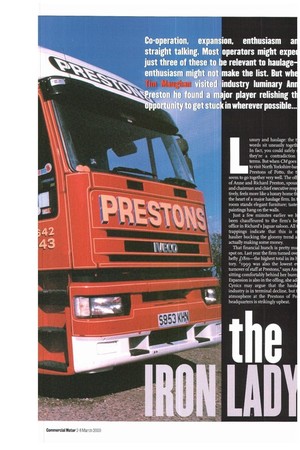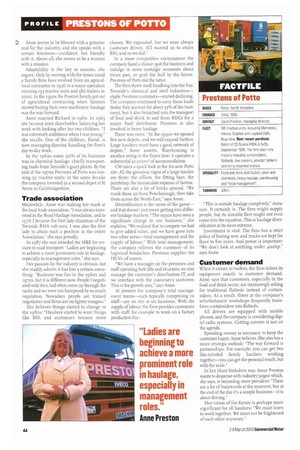Co-operation, expansion, enthusiasm a straight talking. Most operators might expe just three of these to be relevant to haulage
Page 45

Page 46

If you've noticed an error in this article please click here to report it so we can fix it.
enthusiasm might make the list. But wh visit I industry luminary An ound a m jor player relishing t o get stuck in wherever possible...
Luxury and haulage: the words sit uneasily toge In fact, you could safely they're a contradiction terms. But when CM goes to visit North YorkshirePrestons of Pot to, the seem to go together very well. The o of Anne and Richard Preston, spous and chairman and chief executive r tively, feels more like a luxury home the heart of a major haulage firm. In room stands elegant furniture; taste paintings hang on the walls.
Just a few minutes earlier we been chauffeured to the firm's h office in Richard's Jaguar saloon, All trappings indicate that this is haulier bucking the gloomy trend a actually making some money.
That financial hunch is pretty m spot on. Last year the firm turned ov hefty i8m—the highest total in its tory. "1999 was also the lowest e turnover of staff at Prestons," says A sitting comfortably behind her bure Expansion is also in the offing, she ad Cynics may argue that the haul industry is in terminal decline, but atmosphere at the Prestons of Po headquarters is strikingly upbeat. 0 Anne seems to be blessed with a genuine zeal for the industry, and she speaks with a certain feistiness—confident, but friendly with it. Above all, she seems to be a woman with a mission.
Adaptability is the key to success, she argues. Only by moving with the times could a family firm have evolved from an agricultural contractor in 1936 to a major operation running 195 tractive units and 580 trailers in z000. In the 19505 the Preston family got out of agricultural contracting when farmers started buying their own machinery: haulage was the way forward.
Anne married Richard in 1960. In 1965 she became joint shareholder, balancing her work with looking after her two children. "I was extremely ambitious when I was young," she recalls, One of the children, David, is now managing director, handling the firm's day-to-day work.
In the 196os some 90% of its business was in chemical haulage, chiefly transporting loads from Teesside's giant plants. By the end of the 1970s Prestons of Potto was running 50 tractive units: in the same decade the company invested in a second depot at St Neots in Cambridgeshire.
Trade association
Meanwhile, Anne was making her mark at the local trade association. "I was always interested in the Road Haulage Association, and in 1976 I became the first lady chairman of the Teesside RH A sub area. I was also the first lady to attain such a position in the entire Association," she says proudly.
In 1987 she was awarded the MBE for services to road transport: "Ladies are beginning to achieve a more prominent role in haulage, especially in management roles," she says.
Her passion for the industry is obvious, but she readily admits it has lost a certain something: "Business was fun in the 196os and 19705, but it is different now People I negotiated with then had often come up through the ranks and we were not hampered by so much regulation. Nowadays people are trained negotiators and finns are on tighter margins."
She believes things started to change in the I98os: "Hauliers started to want things like BSI, and customers became more choosy. We expanded, but we were always customer driven. ICI wanted us to attain BSI, and so we did."
In a more competitive environment the company faced a choice: quit the business and indulge in some nostalgic moments about times past, or grab the bull by the horns. Prestons of Potto did the latter.
The firm threw itself headlong into the fray. Teesside's chemical and steel industries— staple Prestons customers—started declining. The company continued to carry these loads (today they account for about 35% of the business), but it also branched into the transport of food and drink to and from RDCs for a major food distributor. Prestons is also involved in heavy haulage.
There was more. "In the 1990s we opened five new depots, and we will expand further. Large hauliers must have a good network of depots," Anne asserts. Warehousing is another string to the firm's bow: it operates a substantial 32,500m2 of accommodation.
CM takes a quick look at the 6o-acre Potto site. All the giveaway signs of a large haulier are there: the offices, the fitting bays, the paintshop, the immaculate expanse of tarmac. There are also a lot of bricks around. "We trunk these up from Peterborough, then take them across the North-East," says Anne.
Diversification is the name of the game— and that doesn't just mean getting into different haulage markets. "The 1990s have seen a significant change in our business," she explains. "We realised that to compete we had to give added value, and we have gone into two other areas—total management and the supply of labour." With total management, the company relieves the customer of its logistical headaches. Prestons supplies the HGVs, of course.
"We have a manager on the premises and staff operating fork-lifts and shunters; we also manage the customer's distribution IT, and we interface with the customer's customer. This is the growth area," says Anne.
At present the company's total management teams—each typically comprising to staff—are on site at six locations. With the supply of labour, the firm provides customers with staff, for example to work on a factory production line.
"This is outside haulage completely," Anne says. it certainly is. The firm might supply people, but its sizeable fleet might not even come into the equation. This is haulage diversification at its most extreme.
Investment is vital. The firm has a strict policy of buying new, and trucks are kept for three to five years. And power is important: "We don't look at anything under 400hp," says Anne.
Customer demand
When it comes to trailers, the firm tailors its equipment exactly to customer demand, Anne says that customers, especially in the food and drink sector, are increasingly asking for traditional flatbeds instead of curtainsiders. As a result, fitters at the company's refurbishment workshops frequently transform curtainsiders into flatbeds.
All drivers are equipped with mobile phones, and the company is considering digital radio systems. Cutting corners is not on the agenda.
Spending money is necessary to keep the customer happy, Anne believes. She also has a more strategic outlook: "The way forward is partnerships. For example, you can get two like-minded family hauliers working together—you can get the personal touch, but with the scale."
In her blunt Yorkshire way, Anne Preston wants to dispense with industry jargon which, she says, is becoming more prevalent: "There are a lot of buzzwords at the moment, but at the end of the day it's a simple business—it is about driving."
Her vision of the future is perhaps more significant for all hauliers: "We must learn to work together. We must not be frightened of each other anymore."








































































































